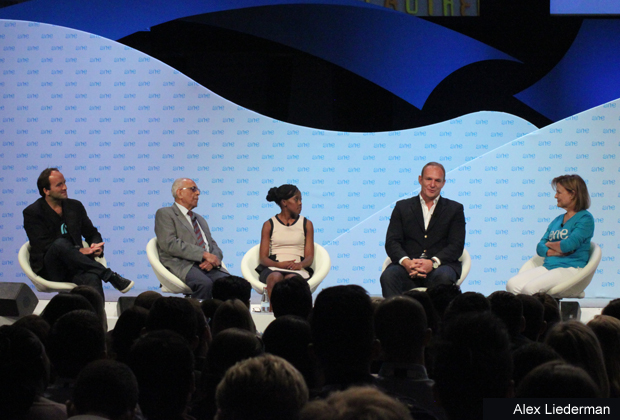One Young World Co-founder, David Jones reflects on what the current generation of leaders can learn from the younger generation.
[[[image-0 native]]]
While one group of senior leaders in America were causing a government to close, another group of brilliant young leaders were gathering in Johannesburg for the fourth annual One Young World Summit.
The contrast between the two couldn't have been more stark.
India's youngest ever elected politician, 26-year-old Ashish Damle, stood on stage and said "Today, youngsters on Facebook write, 'I hate politics.' But I want them to say, 'I will change politics.' They can make a big difference. I want them to understand that politics is not a dirty game, there are only dirty players."
Wise words indeed. He was followed by 20-year-old Philippe Rival, a French/Australian delegate whose speech was even more pertinent: "There's one issue I've observed in both France and Australia, which have both had an election in the past year: I find the biggest obstacle to actual good politics is party politics. The reason why the US government is still shut down today is not because 500 members of Congress don't want a government, it's because they prefer voting on party lines to actually getting things done. I'd ask you all to go for politics, but don't fall into the trap of going for party politics."
And he's right. Party politics in America threatens to throw us all back into crisis, just as the world's economy was getting nicely back to it's feet.
Now it's a tough time for politicians. The world has gone global, people are now global, business is global, the financial system is global yet they are stuck in a local model. But though we may have some sympathy for their inability to function effectively on a global stage in a world that's left them behind, this current crisis in Washington is one of their own parochial making.
In his speech to One Young World, Paul Polman the CEO of Unilever cited a famous African proverb that says, "if you want to go fast, go alone, if you want to go far, go together." Perhaps we should amend that to, "if you want to slowly go nowhere, move to Washington."
The other challenge facing politicians is that for the first time in history technology doesn't actually help them -- every other iteration of technology from the megaphone to radio to TV did, as they were perfect one way broadcast mechanisms -- but the new digital world has given the power to the people, not the leaders, who are now subject to a level of scrutiny, accountability and transparency that is unprecedented.
And it is the digital revolution that has made this millennial generation so unique and so different from those currently in power. Technology has made them the smartest generation ever, democratizing education and giving them access to unlimited amounts of knowledge. It has made them the most responsible generation ever as it has brought to their attention how serious many of the issues in the world are. But perhaps most importantly it has made them the most powerful generation of young adults ever -- as it is they who best understand how to use the power of digital and social media to drive positive change. This is the first time in history that the world's youngest adults understand more than older adults about the biggest revolution changing the world.
It has also taught them the rules of "new power" -- collaborative, open, transparent and bottom-up, while America's politicians remain stuck in the top-down, command and control, closed world of "old power." It is this that was so visible in Johannesburg amongst the young leaders, that is so visibly missing in Washington.
As Jordanian delegate and the UN Secretary General's Youth Envoy Ahmad Alhendawi said: "As societies enter the digital age, politicians remain in the analog. Political institutions have failed to catch up with the speed at which young people are changing things."
In Johannesburg as well as hearing from the brilliant young delegates, we also heard from many of the world's great senior leaders - including Kofi Annan, Muhammad Yunus, Bob Geldof -- and from those closest to Mandela about that great man -- Ahmed Kathrada who was convicted with Mandela and spent 26 years in Robben Island prison and Francois Pienaar who was inspired by Mandela to lead South Africa to a victory in the 1995 Rugby World Cup that united a nation.
The one thing that all these great leaders have in common, is that they have consistently put others before themselves. They have left self-interest to one side in order to make progress and drive change.
By contrast those currently in Washington haven't shown us anything other than self-interest.
And while in Congress politicians worked out how they were going to be able to turn whatever the result was into a victory for themselves, 1,300 brilliant young people from 190 countries returned home to try and do something to make the world a little better.
The young leaders assembled in Johannesburg demonstrated that while we may not be able to be optimistic about the present, we can certainly be optimistic about the future.
As Kofi Annan said when he addressed them, "I feel confident that the future is in good hands and that you will succeed where my generation has failed".
The sooner they are in place in Washington the better.
